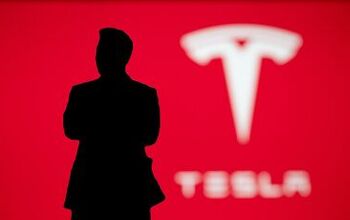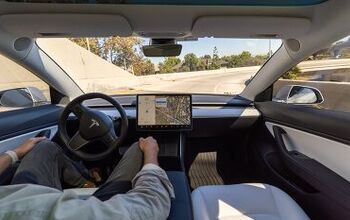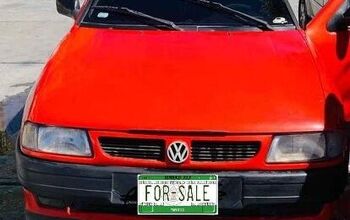Volkswagen's Prank Play Presents Problems [UPDATED]

I hope this is the last time I write about Volkswagen’s April Fool’s Day faceplant this week.
Really, I do. The clicks are nice, but variety is the spice of life.
That said, it’s been a lot to process, at least in terms of marketing crackups. I’ve reported on it, asked you about it, read Matt’s take — and before this story dies the death it so richly deserves, I just wanted to pile on one last hot take.
This morning, I asked you how bad the prank was. Meaning was it no big deal, mildly annoying, absolutely terrible, or what?
I think the one thing we can all agree on was that it was hamfisted. If the press release hadn’t been placed on VW’s media site prematurely, the whole kerfuffle gets avoided. The release runs tomorrow, everyone rolls their eyes, a few folks fulminate on Twitter about how crappy most April Fool’s jokes, especially those perpetrated by corporate America, are and we move on with our lives.
The problem, in my view, is that a bad decision followed. Volkswagen, wanting to avoid spoiling the joke, lied directly to, or at least inadvertently misled, the press. That decision, combined with a press release that looked quite real, led to some very good reporters believing that VW really was going forward with a name change. In fact, I bet some people still believe they really were considering the change and have used April Fool’s Day as an excuse to walk it back.
A point of clarification: We said yesterday the press was lied to, but further digging has shown that it’s unclear if the media was lied to or inadvertently misled, and VW declined to comment on the record when I reached out.
Predictably, some members of the press were quite upset. Understandably so, as no one likes to get fooled, and VW’s lies/untruths led to inaccurate reporting, which damages credibility. No journalist wants their credibility damaged by a lie or untruth someone else — someone they trusted — told. And as I wrote yesterday, this wasn’t the kind of claim a journalist could easily independently verify. CNBC, the Associated Press, USA Today, and others were at the mercy of VW.
Add in the added context of today’s discourse, which is chock full of powerful people and companies intentionally spreading misinformation for fun and profit, as well as the context of VW’s past sins regarding the truth, and well, it’s understandable that a lot of people were pissed off.
Update: Some folks have pointed out that journalists failed by not investigating domain names or trademark registrations. I think that’s a red herring, as we don’t know if the reporters did or did not look at those — at least one reporter mentioned on social media that he did, and he also pointed out that the lack of a domain or trademark registration isn’t necessarily proof that it was a prank. The point is, VW misled or outright lied to reporters who were skeptical and asking for confirmation.
I do think some of the outraged automotive journalists oversimplified things a bit. While I absolutely agree that they have a right to be pissed off at VW here — again, the reporters are going to take flack for something that someone else did, and that sucks — it’s not like automakers never lie to us or tell us untruths. To act as if they’ve never been lied to — or at least misled, even unintentionally — by an OEM source reads as a bit naïve.
That said, in this specific instance, VW had no reason, save for not spoiling the joke, to mislead anyone, and the topic of a brand changing names is big. So I understand why the reporters who were misled were upset. I would’ve been, too.
I mean, we believed it. In part, that’s on us for not reaching out to VW ourselves, which we usually do and should’ve done. Then again, we might’ve also been misled had we done so. Regardless, we believed that VW was changing names for two reasons: One, we trusted the reporting from USA Today and others, and two, because the press release looked legit.
That first reason is why the reporters are so upset. VW damaged not only its own credibility but also theirs. VW probably should’ve understood that reporters would take what they were told as the truth since there weren’t many other ways to easily and quickly verify what VW was saying, and that the most obvious way to verify the claim — the press release — didn’t give the appearance that VW was just having a laugh.
In the end, VW still got a lot of publicity — including several posts from us — and any professional relationships that were frayed might be smoothed out with time. Still, there are several lessons to be learned.
- If you’re a company planning an April Fool’s press release, take extra care to make sure it doesn’t leak.
- If it does leak, and reporters ask if the plans are real or part of a gag, and you don’t want to spoil the gag, either ignore the media until the full story comes out or find a way to deny the truth that isn’t going to mislead reporters into reporting a prank as real.
- If you’re a reporter, make sure you pepper your story with caveats even if you think you have confirmation. And be careful about being overly reliant on sources. I understand that in this instance, it may have been difficult, if not impossible, to independently verify what sources said, but there may be creative ways to do so.
I can’t wait to see which brand screws up their April Fool’s gag next year.
[Image: Volkswagen]

Tim Healey grew up around the auto-parts business and has always had a love for cars — his parents joke his first word was “‘Vette”. Despite this, he wanted to pursue a career in sports writing but he ended up falling semi-accidentally into the automotive-journalism industry, first at Consumer Guide Automotive and later at Web2Carz.com. He also worked as an industry analyst at Mintel Group and freelanced for About.com, CarFax, Vehix.com, High Gear Media, Torque News, FutureCar.com, Cars.com, among others, and of course Vertical Scope sites such as AutoGuide.com, Off-Road.com, and HybridCars.com. He’s an urbanite and as such, doesn’t need a daily driver, but if he had one, it would be compact, sporty, and have a manual transmission.
More by Tim Healey
Latest Car Reviews
Read moreLatest Product Reviews
Read moreRecent Comments
- MaintenanceCosts "And with ANY car, always budget for maintenance."The question is whether you have to budget a thousand bucks (or euro) a year, or a quarter of your income.
- FreedMike The NASCAR race was a dandy. That finish…
- EBFlex It’s ironic that the typical low IQ big government simps are all over this yet we’re completely silent when oil companies took massive losses during Covid. Funny how that’s fine but profits aren’t. These people have no idea how business works.
- Ajla Goldman Sachs 🥂
- Rna65689660 DVR and watch all that are aired. Has been this way for 40 years.


































Comments
Join the conversation
Perhaps it is inevitable that some journalists mislead/misinform/jump the shark due to the incidence of being lied to by those they cover - big business, politicians, pharmaceutical companies, vehicle manufacturers, leaders, followers and your grandma. The influence is largely unavoidable.
Interesting that even Peter DeLorenzo at “autoextremist.com” fell for it, basing his entire weekly rant on this, then having to add a correction half-again as long as the column itself for the mea culpa!